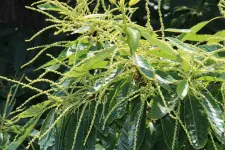Researchers discover unique 'spider web' mechanism that traps, kills viruses
2021-06-29
(Press-News.org) Immunologists at McMaster University have discovered a previously unknown mechanism which acts like a spider web, trapping and killing pathogens such as influenza or SARS-CoV-2, the virus responsible for COVID-19.
The researchers have found that neutrophils, the most abundant white blood cells in the human body, explode when they bind to such pathogens coated in antibodies and release DNA outside of the cell, creating a sticky tangle which acts as a trap.
The findings, published online in the Proceedings of the National Academy of Science, are significant because little is understood about how antibodies neutralize viruses in the respiratory tract.
The discovery has implications for vaccine design and delivery, including aerosol and nasal spray technologies that could help the body head off infections before they have a chance to take hold.
"Vaccines can produce these antibodies that are present in our lungs, which are the first type of antibody to see viruses like flu or COVID-19, which infect our lungs and respiratory tracts," says the study's lead author Matthew Miller, an associate professor at McMaster's Michael G. DeGroote Institute for Infectious Disease Research and Canada's Global Nexus for Pandemics and Biological Threats. "Mechanisms that can stop the infection at the site where it enters our body can prevent the spread and serious complications."
By comparison, injectable vaccines are designed to bolster antibodies in the blood, but those antibodies are not as prevalent at the sites where infection begins.
"We should be thinking carefully about next generation COVID-19 vaccines that could be administered in the respiratory tract to stimulate antibodies. We don't have many candidates right now that are focused on raising the mucosal response," says Hannah Stacey, a graduate student in the Miller Lab and lead author of the paper, who recently won a major national scholarship from the Canadian Society for Virology for her work on COVID-19.
"If you want a lot of these antibodies that are really abundant in blood, then injections make the most sense, but if you want antibodies that are abundant in the respiratory tract, then a spray or an aerosol makes sense," she says.
Researchers caution that while the body's spider-web mechanism has the potential to be hugely beneficial, it can cause harm too, including inflammation and further illness when the web formation is uncontrollable.
They point to the early waves of the pandemic, prior to vaccinations, when these NETs, or neutrophil extracellular traps, were found in some patients' lungs, and had made their breathing more difficult.
"An immune response that is meant to protect you can end up harming you if it's not properly controlled," says Miller. "It's important to understand the balance of the immune system. If you have a lot of these antibodies before you get infected, they are likely going to protect you, but if the infection itself stimulates a lot of those antibodies it might be harmful."
INFORMATION:
[Attachments] See images for this press release:

ELSE PRESS RELEASES FROM THIS DATE:
2021-06-29
One of the key mutations seen in the 'Alpha variant' of SARS-CoV-2 - the deletion of two amino acids, H69/V70 - enables the virus to overcome chinks in its armour as it evolves, say an international team of scientists.
SARS-CoV-2 is a coronavirus, so named because spike proteins on its surface give it the appearance of a crown ('corona'). The spike proteins bind to ACE2, a protein receptor found on the surface of cells in our body. Both the spike protein and ACE2 are then cleaved, allowing genetic material from the virus to enter the host cell. The virus manipulates the host cell's machinery to allow the virus to replicate and spread.
As SARS-CoV-2 ...
2021-06-29
A conclusive narrative review has found physical punishment of children is not effective in preventing child behavior problems or promoting positive outcomes and instead predicts increases in behavior problems and other poor outcomes over time. The study by an international group of scientists including a researcher from The University of Texas at Austin was published today in The Lancet.
Caregivers in many parts of the world use physical punishment as a response to children's perceived misbehavior: 63% of children between the ages of 2 and 4 worldwide - approximately 250 million children - are regularly subjected ...
2021-06-29
Phase 1/2 clinical trial of CoronaVac in 550 children and adolescents aged 3-17 years in China suggests two doses of the vaccine are safe and generate a strong antibody response.
First published data on safety and immune response generated by a COVID-19 vaccine in children as young as 3-years-old supports use of CoronaVac - which was recently approved for emergency use in China among children over 3-years-old - in further studies to inform immunisation strategies.
Two doses of CoronaVac are safe and provoke a strong antibody response among children and adolescents ...
2021-06-29
In first-of-its kind research led by a University of Massachusetts Amherst psychotherapy researcher, mental health care patients matched with therapists who had a strong track record of treating the patients' primary concerns had better results than patients who were not so matched.
In addition, this "match effect" was even more beneficial and pronounced for patients with more severe problems and for those who identified as racial or ethnic minorities.
The findings are published in JAMA Psychiatry and the Journal of Consulting and Clinical Psychology.
"One of the things we've been learning in our field ...
2021-06-29
PULLMAN, Wash. - A research team led by Washington State University has created a computer model to understand how plants store energy in the thylakoid membrane, a key structure to photosynthesis in plant leaves.
The team confirmed the accuracy of the mathematical model with lab experiments. Their work was recently published in the journal Nature Plants.
"We provided an important piece to the overall puzzle of plant metabolism," said Helmut Kirchhoff, a professor in WSU's Institute of Biological Chemistry and leader of the team who made this discovery. "If we integrate our model into the bigger picture, it may provide a good path for how to improve plants for ...
2021-06-29
Two recent collaborative publications by CU Cancer Center members provide insights into how chronic inflammation can serve as a key factor in the development of leukemia and other blood cancers.
Eric Pietras, PhD, CU Cancer Center member and assistant professor in the CU School of Medicine Division of Hematology, and James DeGregori, PhD, deputy director of the CU Cancer Center and professor in the Department of Biochemistry and Molecular Genetics, were corresponding authors on both papers.
Both papers provide support for the theory of adaptive oncogenesis, which was developed by DeGregori. The theory stipulates that chronic inflammation (such ...
2021-06-29
AMES, Iowa - During the course of a criminal investigation, it is common for investigators to interview individuals who are exhausted and have had little sleep. While unavoidable in some cases, a new Iowa State University study found sleep disruption or deprivation may limit the amount of information provided during an interview.
The study, published in the academic journal SLEEP, is one of the first to look at how sleep affects behavior during interrogations or interviews. Zlatan Krizan, an ISU professor of psychology, says while beliefs about the impact of sleep on interrogation subjects have existed for decades, he and co-authors, ISU professor Christian Meissner and graduate student Anthony Miller, found little direct scientific evidence related to its effectiveness. Krizan ...
2021-06-28
A new national study finds that children in the United States with greater screen time usage at ages 9-10 are more likely to gain weight one year later.
The study, publishing in Pediatric Obesity on June 28, found that each additional hour spent on virtually all forms of screen time was associated with a higher body mass index (BMI) one year later. In particular, researchers found that each extra hour spent watching or streaming television, YouTube videos, video games, video chat, and texting led to a higher risk of weight gain one year later. At the start of the study, 33.7% of children were considered overweight ...
2021-06-28
Scientists isolated a molecule, extracted from the leaves of the European chestnut tree, with the power to neutralize dangerous, drug-resistant staph bacteria. Frontiers in Pharmacology published the finding, led by scientists at Emory University.
The researchers dubbed the molecule Castaneroxy A, after the genus of the European chestnut, Castanea. The use of chestnut leaves in traditional folk remedies in rural Italy inspired the research.
"We were able to isolate this molecule, new to science, that occurs only in very tiny quantities in the chestnut leaves," says Cassandra Quave, senior author of the paper and associate professor in Emory's Center for the Study of Human Health and the School of Medicine's ...
2021-06-28
COLUMBUS, Ohio -- Mountaintop glacier ice in the tropics of all four hemispheres covers significantly less area -- in one case as much as 93% less -- than it did just 50 years ago, a new study has found.
The study, published online recently in the journal Global and Planetary Change, found that a glacier near Puncak Jaya, in Papua New Guinea, lost about 93% of its ice over a 38-year period from 1980 to 2018. Between 1986 and 2017 the area covered by glaciers on top of Kilimanjaro in Africa decreased by nearly 71%.
The study is the first to combine NASA satellite imagery with data from ice cores drilled during field expeditions on tropical ...
LAST 30 PRESS RELEASES:
[Press-News.org] Researchers discover unique 'spider web' mechanism that traps, kills viruses




